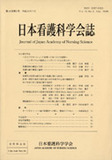Japanese
English
- 販売していません
- Abstract 文献概要
- 参考文献 Reference
要旨
本研究では,痴呆患者の体格指標としてのbody mass index (BMI)の入院後の減少と,食欲の程度,徘徊の有無,寝たきり状態への移行などの生活上の変化との関連について検討することを目的に既存のデータを分析した.対象は,老年期痴呆疾患(アルツハイマー病,アルツハイマー型老年痴呆,単純型老年痴呆)の患者33名(痴呆群)と,非痴呆の精神疾患の患者10名(非痴呆群)とした.
入院時点における痴呆群と非痴呆群の体重ならびにBMIに有意差はなかったが,調査時点における痴呆群の体重とBMIは入院時点と比較して有意に低下していた一方,非痴呆群では有意な変化が認められなかった.また,痴呆群のBMIの低下幅に徘徊の有無や食欲の程度の違いによる有意差は認められなかった.痴呆群におけるBMIと寝たきり状態への移行との関連では,寝たきりの痴呆患者のBMIは入院時点から寝たきりに移行した時点との間で,また寝たきりでない痴呆患者のBMIは入院時点から調査時点との間で,それぞれ有意な低下が認められた.
痴呆・非痴呆両群のBMIの低下には,徘徊や食欲の程度の違いによる有意な差は見られなかったが,痴呆群は非痴呆群よりも入院後有意にBMIが低下し,また痴呆群では寝たきり状態への移行とBMIの低下との間に何らかの関連があることが示唆された.このことから,高齢痴呆患者のケア・ニーズの判断指標の一つとしてBMIは有用であると考えられる.
Abstract
The purpose of this study was to explore the relationships between the decrease of body mass index (BMI) and alterations in life-related clinical features of the hospitalized elderly with senile dementia, including: appetite loss, manifestation of wandering, and a shift to the bed-ridden stage. The data were collected retrospectively from patients' medical and nursing records. The dementia group was defined as 33 patients (male/female=10/23, age=72.1±11.2), which included those with Alzheimer's disease (13), senile dementia of Alzheimer's type (10), and senile dementia (10). The non-dementia group was defined as 10 psychiatric patients (male/female=2/8, age=78.1±6.7), with no diagnosis of dementia.
Upon these patients' admissions, no significant differences were found between the BMIs of the dementia group and that of the non-dementia group. Significant changes in the BMIs of the dementia group were found between their admissions (21.9Kg/m2) and the point of investigation (18.6Kg/m2) (P<0.01). On the other hand, no significant changes were found in the BMIs of the non-dementia group during their hospitalization.
Regarding the dementia group, BMIs have significantly decreased in all of the following groups: those with manifestations of wandering; those with appetite loss; and those without these symptoms. The BMIs of the bed-ridden group in the dementia group significantly decreased from their admissions (18.4Kg/2) to their early bed-ridden stages (16.2Kg/m2)(P<0.05), and from their admissions to the point of investigation (15.3Kg/2)(P<0.01). The BMIs of the non bed-ridden patients in the dementia group also decreased significantly from their admissions (23.7Kg/m2) to the point of investigation (20.2Kg/m2)(P<0.01).
Body weight loss and BMI decrease was significantly associated with the diagnosis of dementia and the shift to the bed-ridden stage, but was not associated with manifestation of wandering or appetite loss among the life-related clinical variables. The findings of this study suggest that BMI can be an effective indicator to assess and detect the care-needs of patients with senile dementia.
Copyright © 1998, Japan Academy of Nursing Science. All rights reserved.


